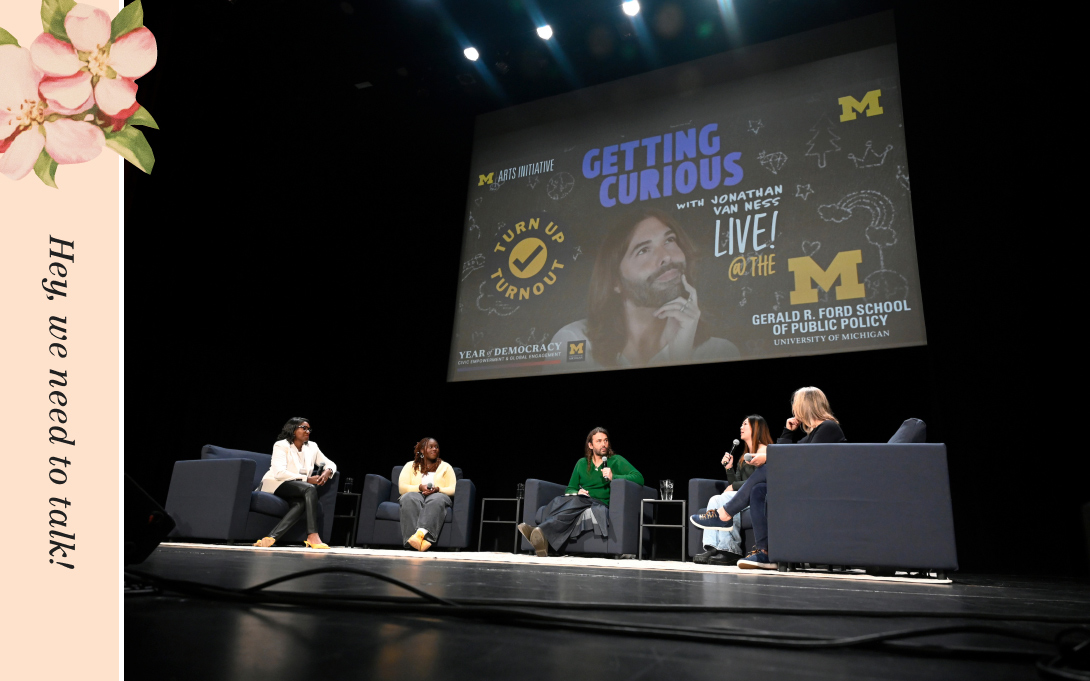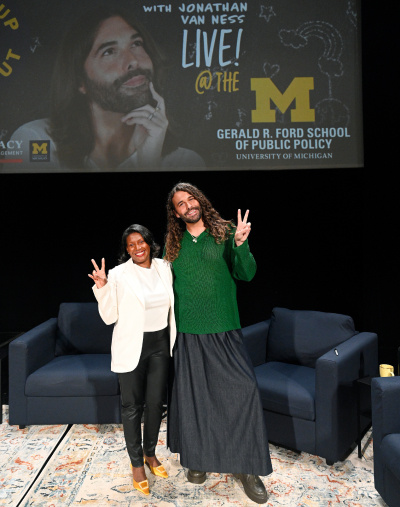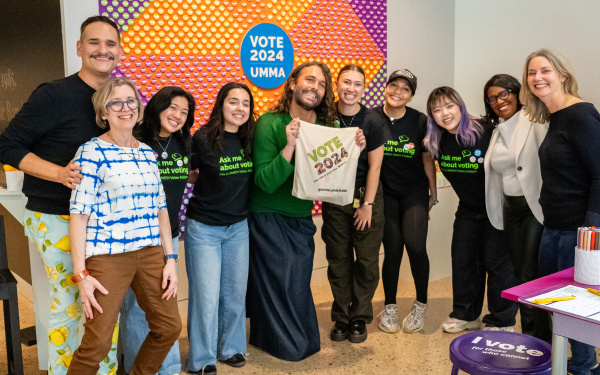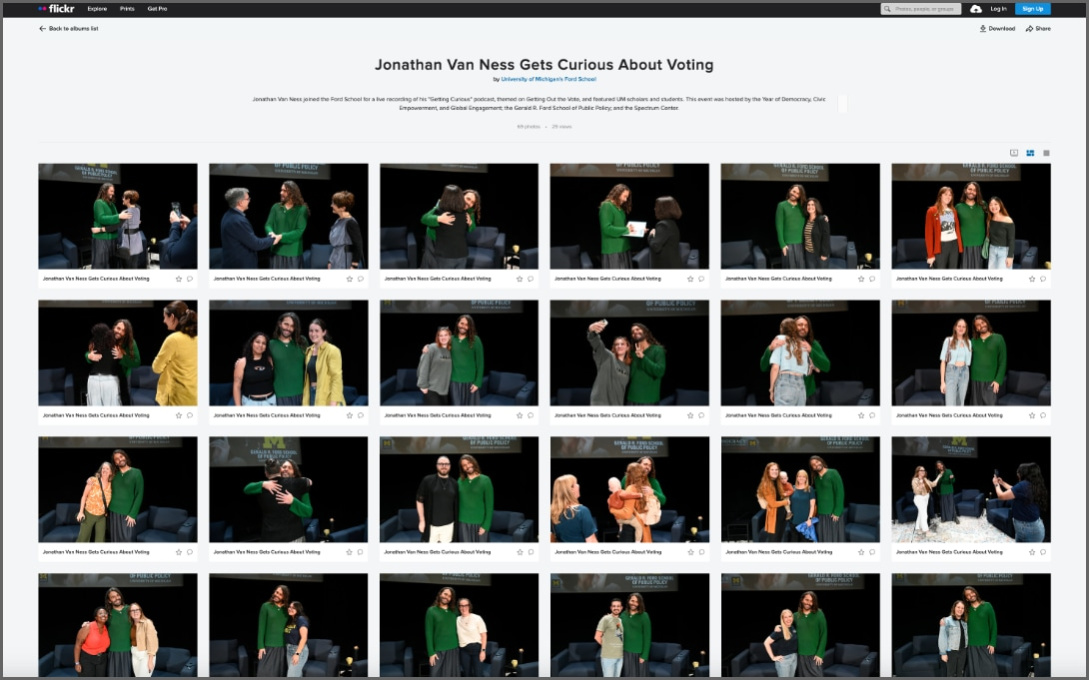
Celebrated, Emmy Award-winning TV producer (Queer Eye), bestselling author, and host of the popular podcast Getting Curious, Jonathan Van Ness, who identifies as non-binary, has used their platform to champion a range of social issues close to their heart. Sociologist Dean Celeste Watkins-Hayes first met Van Ness in 2019. Van Ness had publicly shared that they were living with HIV, and Watkins-Hayes wrote a New York Times op-ed that drew lessons from Van Ness’s story to highlight the importance of the Ryan White CARE Act and other policies and programs for people living with HIV.
Watkins-Hayes has twice appeared on Getting Curious to share her research, and the two share mutual respect along with an interest in amplifying the importance of the HIV public safety net.
In October, the Ford School co-hosted Van Ness at the Michigan Theater for a live recording of their podcast as part of U-M’s Year of Democracy events. In the episode titled, “What’s it like to be a college voter in a swing state this election?,” Van Ness discusses voting and civic engagement with Watkins-Hayes; Ford School political scientist Jenna Bednar; and Hillary Poudeu-Tchokothe and Maurielle Courtois, the co-presidents of Turn Up Turnout, U-M’s nonpartisan, student-led effort dedicated to increasing voter registration and turnout for college students.
A week before the live recording, Watkins-Hayes turned the tables and interviewed Van Ness for State & Hill.

Celeste Watkins-Hayes: Most folks with a passion for public policy have an origin story that motivates their interest. Can you share a little bit about yours?
Jonathan Van Ness: I think what drives me the most are, one, being a very bullied queer kid that grew up in a very small rural town. I felt very othered and didn’t fit in, which brought up this drive to want people to feel taken care of and know there’s space for them. I also was a survivor of abuse, which led to addiction, which led to me contracting HIV. And I think navigating the HIV social safety net at 25 made me realize the way that policy interacts with people’s lives.
CWH: It’s been such a big part of your advocacy work as well. When you publicly shared that you were living with HIV, I wrote a New York Times op-ed that spoke to the very important role that the HIV safety net has played in your story and the stories of others. Can you explain to readers what it is?
JVN: The HIV safety net is a collection of programs that come together from the state and federal government to assist someone with HIV through policies like the Ryan White CARE Act, the Aids Drug Assistance Program, and the work of places like the Aids Healthcare Foundation. The safety net also does a lot of HIV prevention work. These programs are less robust in some places because states may not accept federal funds or incentivize a strong safety net.
CWH: It’s fascinating how you’ve expanded your circle of influence over the course of your career, shaping how people get their information about important policy topics. What has it been like to serve as a policy influencer, and how do you think about the responsibility that comes with it?
I am just blown away by the level of information and awareness of so many different things by college students meet, which think is so exciting. But with that information comes responsibility."
Jonathan Van Ness
JVN: If I’m passionate about something, I want to learn about it and share what I learn. But I’ve noticed times when I ask myself, ‘Am I the one to talk about this?’ There is this imposter syndrome. But what drives me is that there are people who don’t know. And there are people who take on information in different ways. Some may never read the news, but maybe they’ll want to hear someone talk about it in a podcast who's kind of funny. So maybe that’s my way in.
I’m just so interested in so many different things! I realized I should just learn about it and share it with people. They will take what works for them and maybe go work on those issues.
CWH: Your podcast highlights a lot of different issues—from bias in algorithms, to the child welfare system, criminal justice and mass incarceration, to LGBTQIA rights and protections. What’s your latest policy obsession?
JVN: HIV issues and trans issues are always a focus for me. Lately, it’s been Project 2025 and what I see as the further erosion of the separation between church and state. Right now one of my favorite podcasts is hosted by three constitutional law professors called Strict Scrutiny.
Editor’s note: Strict Scrutiny is a podcast about the U.S. Supreme Court and the legal culture that surrounds it.

CWH: In your upcoming podcast, we are going to discuss young people and voting. What piqued your interest in learning about this topic, and what do you want people to learn?
JVN: I’m so struck by how informed many young people are today. Much more than when I started voting in 2004! We have so many more sources to gather information. I am just blown away by the level of information and awareness of so many different things by college students I meet, which I think is so exciting. But with that information comes responsibility. Hopefully, we can help more people access information to make great choices.
The other thing I want people to know—and I don’t want to be overdramatic—but it took me six hours to vote in 2020 because of absentee ballot issues. There are so many opportunities for you to have your vote not counted. If you don’t make a plan, if you’re not ready, if you don’t make the time. It’s not a joke when they say make a plan! I wish it were so much easier. But good things happen when people show up and vote.
Learn more
Event photos:

More in State & Hill
Below, find the full, formatted fall 2024 edition of State & Hill. Click here to return to the fall 2024 S&H homepage.
